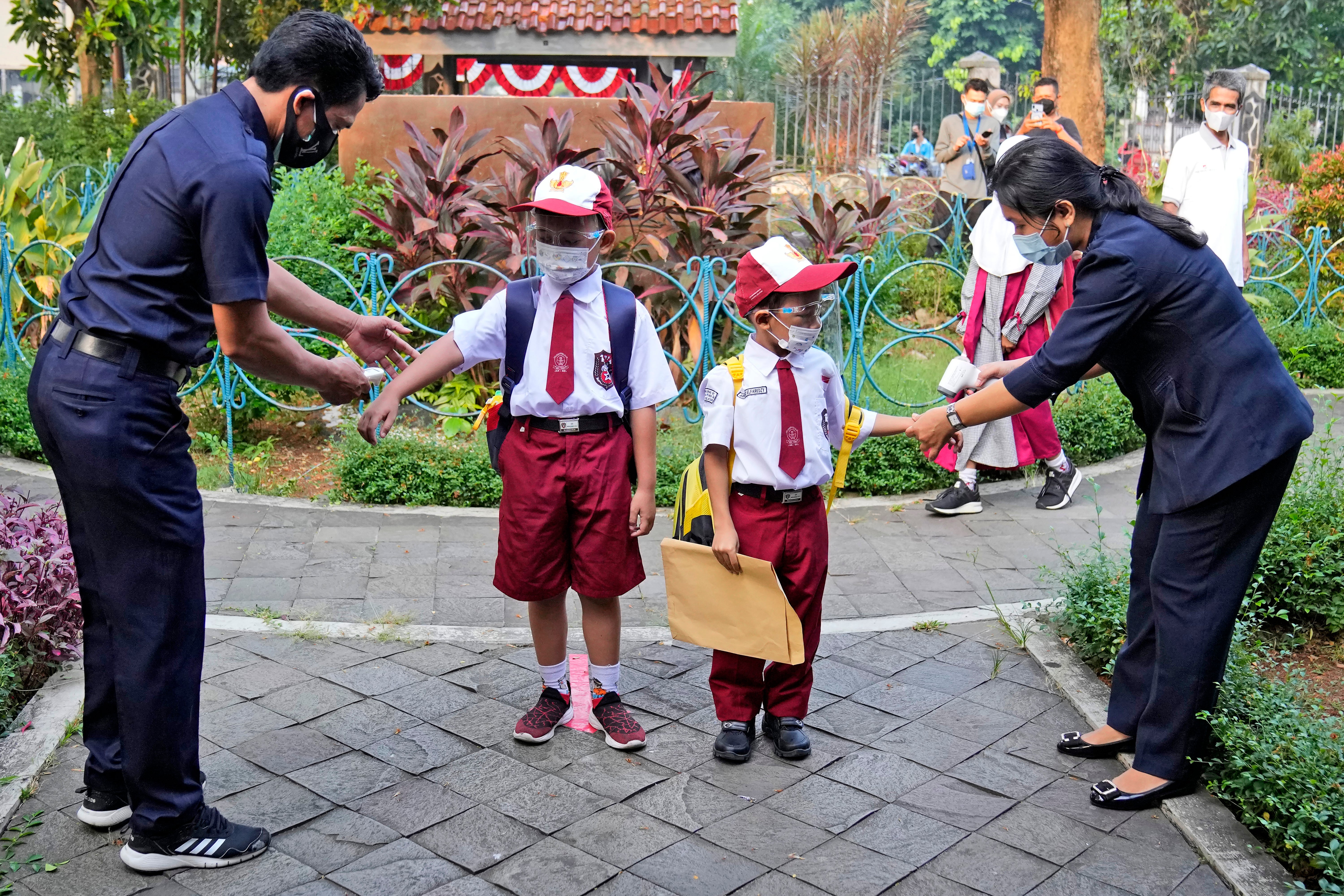Some Indonesian students return to schools, at a distance
School bells in some parts of Indonesia’s capital have rung for the first time in more than a year as some school were allowed to reopen now that the number of new coronavirus infections is on the decline

Your support helps us to tell the story
From reproductive rights to climate change to Big Tech, The Independent is on the ground when the story is developing. Whether it's investigating the financials of Elon Musk's pro-Trump PAC or producing our latest documentary, 'The A Word', which shines a light on the American women fighting for reproductive rights, we know how important it is to parse out the facts from the messaging.
At such a critical moment in US history, we need reporters on the ground. Your donation allows us to keep sending journalists to speak to both sides of the story.
The Independent is trusted by Americans across the entire political spectrum. And unlike many other quality news outlets, we choose not to lock Americans out of our reporting and analysis with paywalls. We believe quality journalism should be available to everyone, paid for by those who can afford it.
Your support makes all the difference.School bells in some parts of Indonesia’s capital have rung again after classes closed by the coronavirus for more than a year were allowed to start reopening on Monday now that the daily count of new COVID-19 cases continues to decline.
A total of 610 schools that have passed the required tests by the Jakarta Education Agency reopened their doors for the first time since the pandemic started, though with many precautions still in place.
The city administration had initially planned to reopen schools in June, but the plan was postponed as another wave of infections triggered by the highly contagious delta variant engulfed the country.
“We had been past the peak of the second wave of COVID-19 infections,” Jakarta Vice Governor Ahmad Riza Patria told reporters on Monday, adding that they hope to reopen all schools in January.
There are about 5,341 schools in Jakarta, ranging from elementary to high school, according to government data.
“I feel nervous,” said Akila Malawa, a 12-year-old student going to class for the first time in more than a year at the Suluh junior high school. “But I’m so happy to see my friends again."
“I hope that coronavirus in Indonesia will end, so, I can go to school and meet friends every day,” said her classmate, Amalwin Harjodisastra.
Schools in several other cities outside Jakarta were also to reopen on Monday.
Even as schools reopen, government guidelines for school facilities have changed many class traditions. Chatting in class is not allowed, facemasks must be worn at all times and no one can leave class for recess. Schools must slash class capacity to 50% by holding classes in two shifts. Teachers must be vaccinated.
In person schooling will be blended with remote learning and gradually increase based on the government's evaluation of the situation.
Indonesia’s Health Ministry reported 7,427 new infections in the past 24 hours on Sunday, the lowest daily total since June 9. There has been a steady decline since the peak on July 15, when more than 56,000 cases were recorded in a single day.
Indonesia, the world's fourth most populous country, has recorded more than 4 million infections since the pandemic began.
Once the country’s COVID-19 epicenter, Jakarta has been seeing declines in both active cases and new cases since mid-July, from more than 100,000 active cases per day to below 8,000 a day and from more than 10,000 new cases per day to below 500.
Also, patients are not being turned away from hospitals like in the past as the bed occupancy rate has declined in several regions. The Central Jakarta Health Service says the bed occupancy rate in several hospitals in Jakarta is now below 30%.
Restrictions on public activities, which the government credits with helping to ease pressure on hospitals, are being eased in the capital. Authorities in Jakarta have reopened malls, places of worship and outdoor sport venues since mid-August with certain capacity limits, and people must show they’ve been vaccinated.
Last month, Indonesia began vaccinating those aged between 12 and 18.
Indonesia began vaccinating earlier than many other countries in Southeast Asia The country aims to inoculate more than 208 million of its 270 million people by March 2022, but authorities have only fully vaccinated 34.8 million people and partially vaccinated another 26.7 million so far.